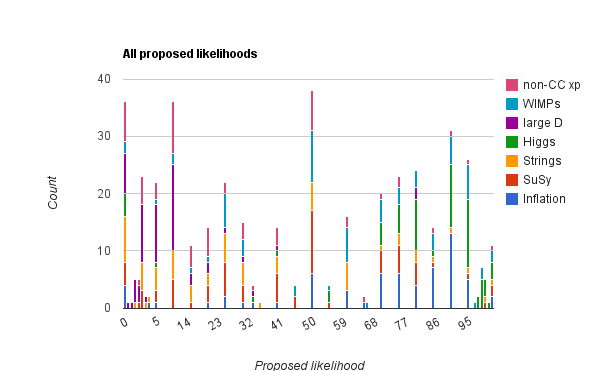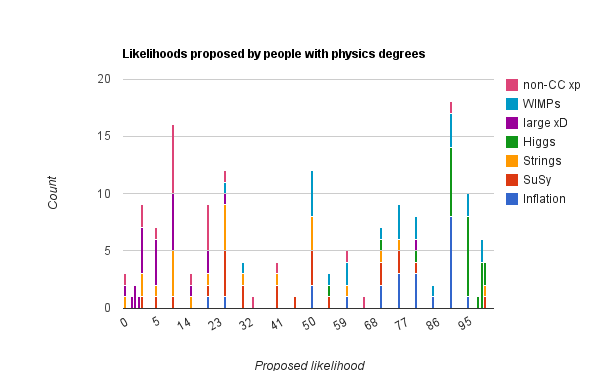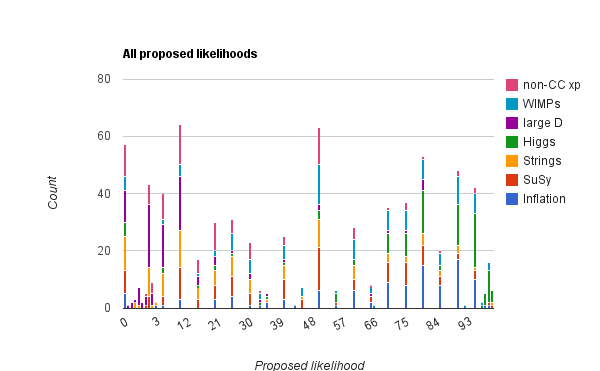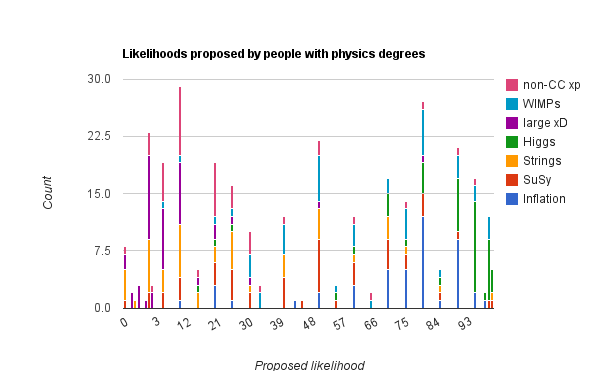Over at Cosmic Variance, Sean Carroll posted yesterday about a straw poll taken at a small gathering of physicists who focus on the cosmological theory of inflation, asking them what they thought the likelihood of the general principle of the theory being true was. He noted that his estimate of of 75% chance was on the low side compared to the majority of the people attending the conference who put the likelihood of inflation being a fact at around 90%. After the conference, he asked several of his colleagues at Caltech, and found that many of them, none of whom were directly working on inflation, put the likelihood at only 25%.
He then asked his readers to present their own estimate for the probability that inflation was true. And he added a few other major theoretical concepts in physics: supersymmetry, string theory, the Higgs boson, large extra dimensions, WIMP dark matter, and “any non-cosmological-constant explanation for cosmic acceleration.” He left the categories quite vague (for example, does “large” mean, “micro/macroscopic” or just “larger than Planck length”) because there are often multiple theories within each category, but for the most part there is a single unifying concept for each theory.
60+ people with a wide range of backgrounds have responded with their estimates now. And the results are interesting in a couple of ways. The two charts below show the how many people proposed specific percentages of the likelihood of each theoretical concept. The interactive versions are available on GoogleDocs.


The first things that jump out at me are that pretty much no one believes that large extra dimensions have any chance of existing (average likelihood being 9.08% with a standard deviation of 15.47), while the Higgs particle is considered quite likely to exist (average = 79.52%, std dev = 26.77), with inflation also having a better than 2/3 chance (average = 67.02%, std dev = 28.81). Amongst those who claimed an educational and/or professional background in physics (and astronomy), large extra dimensions are considered similarly unlikely, but the Higgs boson, inflation, and WIMPs are both considered ~10% more likely than by the commenters as a whole.
On the other hand, the chances given to supersymmetry, string theory, and non-cosmological-constant cosmic expansion are all stable in being considered relatively unlikely by both laymen and scientists alike.
It’s an interesting little bit of meta-analysis, really, which raises some questions about why certain major theories are accepted both in and outside of those educated in physics, why some of those are more accepted within the subset, and why other theories are considered equally less likely, regardless of education. It is likely that “insiders”, as it were, have a firmer basis in the fundamentals of physics and so they are better able to evaluate the theories themselves, which would explain the variation between the insiders and outsiders on certain topics. But I don’t think there is anything about the Higgs boson, or inflation, or WIMPs which differentiates them from the other theories that makes them less comprehensible to those with a physics background.
And since this is a non-rigorous, loosely defined survey, I wouldn’t really want to try to draw any significant conclusions from it. But it is interesting to get a general picture of how various theories are viewed and accepted within the physics community as a whole, and amongst the larger population of laypeople who are interested in modern advancements in the science.
Update 2/11/2011: Over 100 people have commented now.
| Inflation | SuSy | Strings | Higgs | |||||
|---|---|---|---|---|---|---|---|---|
| Avg | Std Dev | Avg | Std Dev | Avg | Std Dev | Avg | Std Dev | |
| Everyone | 66.79 | 28.63 | 44.07 | 30.24 | 30.52 | 30.47 | 76.96 | 27.41 |
| Physics Background | 71.43 | 22.13 | 45.56 | 27.99 | 25.37 | 26.83 | 85.32 | 20.61 |
| Difference | 4.64 | -6.5 | 1.49 | -2.25 | -5.15 | -3.64 | 8.36 | -6.8 |
| large xtra D | WIMPs | non-CC exp | ||||
|---|---|---|---|---|---|---|
| Avg | Std Dev | Avg | Std Dev | Avg | Std Dev | |
| Everyone | 11.76 | 20.01 | 58.41 | 29.36 | 27.74 | 28.38 |
| Physics Background | 8.54 | 14.67 | 60.84 | 25.48 | 25.07 | 25.01 |
| Difference | -3.22 | -5.34 | 2.43 | -3.88 | -2.67 | -3.37 |




